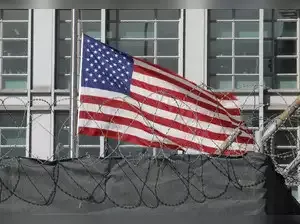Newly unsealed documents give one of the most detailed views yet of the evidence gathered on the accused 9/11 mastermind Khalid Sheikh Mohammed, including how prosecutors allege he and others interacted with the hijackers who carried out the September 11, 2001 attacks. The summaries of evidence released Thursday include Mohammed's own statements over the years, phone records and other documents alleging coordination between Mohammed and the hijackers, videos included in al-Qaida's planning for the attacks and prosecutors' summaries of government simulations of the flights of the four airliners that day. But few other details were given.
Also to be presented are the photos and death certificates of 2,976 people killed that day at the World Trade Center, the Pentagon and in a Pennsylvania field, where the fourth airliner commandeered by the al-Qaida hijackers smashed into the ground after a revolt by passengers.
The newly revealed framework of military prosecutors' potential case against Mohammed, who prosecutors say conceived of and executed much of al-Qaida's attack, is contained in a plea agreement that the Defense Department is battling in court to roll back.
Mohammed and two co-defendants agreed in the plea deal with military prosecutors to plead guilty in the attack in return for life sentences.
The Associated Press, The New York Times, NPR, The Washington Post, Fox News, NBC and Univision are suing to get the plea bargains unsealed. The summaries of the prosecution evidence were released Thursday in a partially redacted version of Mohammed's agreement.
The evidence summaries point to the possibility of additional revelations about the attacks yet to come.
As part of the plea agreement, prosecutors, defense and the senior Pentagon official overseeing the cases at Guantanamo Bay, Cuba, agreed to an unusual step - a hearing that would allow them to make public the evidence compiled against the three.
It appears designed to address complaints from families and others that a plea bargain typically would otherwise keep the evidence from fully being revealed.
Another unusual part of the deal mandated Mohammed to agree to answer questions from the families of victims.
Military prosecutors, defense attorneys and Guantanamo officials negotiated the deal over two years under government auspices. The negotiations were an attempt to bring a resolution to the 9/11 case, which has remained in pretrial hearings for more than two decades since the attacks.
Then-Defense Secretary Lloyd Austin interceded to try to void the plea agreement after it was announced, saying that waiving the possibility of the death penalty in so grave an attack was a decision that defense secretaries should handle.
Federal court hearings in the Defense Department's attempts to roll back the plea agreements are ongoing.
Legal arguments over whether the sustained torture that Mohammed and other 9/11 defendants underwent in CIA custody has rendered their statements in the case inadmissible and has slowed the case. So have repeated staffing changes at the Guantanamo court and the logistical difficulties of holding a trial in a courtroom a plane flight away from the U.S.
Budget with ET
Tax calculator
The newly revealed framework of military prosecutors' potential case against Mohammed, who prosecutors say conceived of and executed much of al-Qaida's attack, is contained in a plea agreement that the Defense Department is battling in court to roll back.
Mohammed and two co-defendants agreed in the plea deal with military prosecutors to plead guilty in the attack in return for life sentences.
The Associated Press, The New York Times, NPR, The Washington Post, Fox News, NBC and Univision are suing to get the plea bargains unsealed. The summaries of the prosecution evidence were released Thursday in a partially redacted version of Mohammed's agreement.
The evidence summaries point to the possibility of additional revelations about the attacks yet to come.
As part of the plea agreement, prosecutors, defense and the senior Pentagon official overseeing the cases at Guantanamo Bay, Cuba, agreed to an unusual step - a hearing that would allow them to make public the evidence compiled against the three.
It appears designed to address complaints from families and others that a plea bargain typically would otherwise keep the evidence from fully being revealed.
Another unusual part of the deal mandated Mohammed to agree to answer questions from the families of victims.
Military prosecutors, defense attorneys and Guantanamo officials negotiated the deal over two years under government auspices. The negotiations were an attempt to bring a resolution to the 9/11 case, which has remained in pretrial hearings for more than two decades since the attacks.
Then-Defense Secretary Lloyd Austin interceded to try to void the plea agreement after it was announced, saying that waiving the possibility of the death penalty in so grave an attack was a decision that defense secretaries should handle.
Federal court hearings in the Defense Department's attempts to roll back the plea agreements are ongoing.
Legal arguments over whether the sustained torture that Mohammed and other 9/11 defendants underwent in CIA custody has rendered their statements in the case inadmissible and has slowed the case. So have repeated staffing changes at the Guantanamo court and the logistical difficulties of holding a trial in a courtroom a plane flight away from the U.S.








